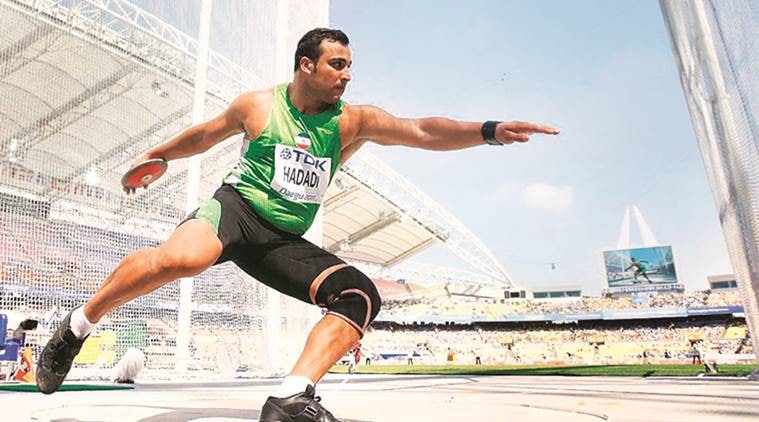 A heavy weight to bear: Discus thrower Ehsan Haddadi is Iran’s first Olympic track-and-field medalist. (Source: Reuters)
A heavy weight to bear: Discus thrower Ehsan Haddadi is Iran’s first Olympic track-and-field medalist. (Source: Reuters)
One morning in March, Iranian discus thrower Ehsan Haddadi, the reigning Asian champion, the 2012 Olympics silver medalist and one of the most imposing athletes in the world, couldn’t get out of bed. He felt a crushing weakness. “I have never felt so weak before. It was hurting all over. Only three days earlier, I had a good training session. I was feeling good,” recounts the athlete.
The day before he fell sick, the 35-year-old had prepared dinner for his parents because they had been feeling under the weather. He and his father underwent tests on March 23, with the latter’s result turning out to be positive for COVID-19. Haddadi grew anxious. Iran is one of the worst COVID-19 ravaged countries in the world, with the World Health Organisation recording over 60,000 confirmed cases in the country and 3,739 deaths (as on April 7). The day after his father tested positive, his own result arrived. He, too, had tested positive.
A towering figure at 6 ft 4 inches, weighing around 135 kg, the Tehran-based athlete was pumped up to beat the virus. After all, in his spectacular career, he has defied several odds and opponents. At the London Olympics, he had fought against 40 other elite throwers from across the globe and finished second to help Iran win its first-ever track-and-field medal at the Games, falling short of the gold mark only by 11cm. He could lift 120 kg without breaking a sweat, but as it turned out, the battle with the virus was far tougher than anything he had imagined.
In many ways, it was a humbling experience for the Olympic medallist. “I am so huge and strong that I never imagined that something so tiny could trouble me so much. Maybe, I needed to be 145 kg. Probably then the virus wouldn’t have affected me,” he says, with a chuckle. Now that he has almost recovered, the athlete can joke about his illness. The situation had been scary last month when he grew sicker by the day. “For the first 10 days, it was very difficult. But I told myself I could fight it. I told my father that athletes are healthy people. We are training all the time, all we need is a few days to recover,” Haddadi says. He couldn’t have been more wrong. “I remember on the sixth day of my quarantine, I was feeling out of breath. I kept telling myself it will get better and, slowly, it did,” he adds. Haddadi and his family will undergo another test this week to ensure that they are in the clear.
For someone who travels most of the year, training and competing around the world, the confinement was disquieting. He has gone under the knife five times, because of injuries, including one on the shoulder in 2008 that kept him out of action for almost a year – but he was usually discharged the same day. The solitude got him thinking about life, giving him a new perspective on sporting glory. “When I was in bed, I thought a lot about life. I realised how feeble it is. You could be healthy one day and die the next day. Running after achievements isn’t the only purpose of life. You need to be a good human being. That is what counts in the end,” he reflects.
With the roughest storm of his life behind him, he is now a relieved man. “I am sure we have recovered because when the virus is in you, you feel it. I am much better now. Next week, I will resume training,” he says.
The highly decorated athlete – he has been on the Asian Games podium since 2006, has clinched half-a-dozen golds in the Asian Championships apart from a bronze in the World Championships in 2011 and the historic Olympic silver in London, 2012 – is approaching the sunset of his career. The Tokyo Olympics, now postponed to 2021, is likely his last shot at another medal at the event. “It is not favourable for players older than 30 because you don’t know how your body will respond next year. For people suffering injuries, it’s a blessing in disguise. I have a small injury and I have time for surgery and recovery. I hope the Olympics happens next year,” he says. Either way, he has decided not to fuss over it, thanks to his new perspective on sporting glory, courtesy “a little invisible intruder”.